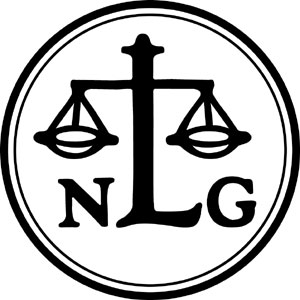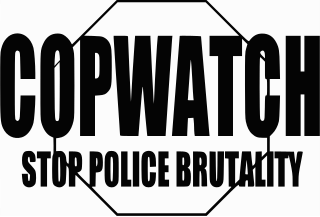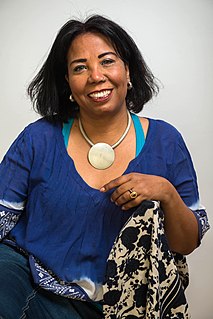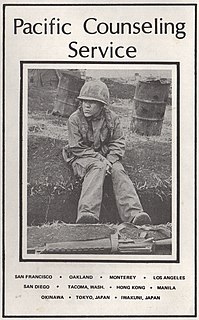S11 refers to a series of protests against meetings of the World Economic Forum on 11, 12 and 13 September 2000 in Melbourne, Australia, where approximately 10,000 people of many ages and a wide cross section of the community were involved. One of the groups involved in the protests called itself the S11 Alliance. This group was dominated by various socialist parties. The success of the protest led them to the creation of the M1 Alliance on 1 November 2000 in preparation for the next year's May Day events and the S26 Alliance, in solidarity with protest against the International Monetary Fund/World Bank meetings in Prague. The other main organising network for the protest was the autonomist & anarchist s11 AWOL.

The National Lawyers Guild (NLG) is a progressive public interest association of lawyers, law students, paralegals, jailhouse lawyers, law collective members, and other activist legal workers, in the United States. The group was founded in 1937 as an alternative to the American Bar Association (ABA) in protest of that organization's exclusionary membership practices and conservative political orientation. They were the first US bar association to allow the admission of minorities to their ranks. The group sought to bring more lawyers closer to the labor movement and progressive political activities, to support and encourage lawyers otherwise "isolated and discouraged," and to help create a "united front" against Fascism.
A law collective is a non-hierarchical organization which provides legal aid to a community or communities in need. Such work ranges from traditional criminal defense, to advocacy on behalf of immigrants, to legal support at large and small protests, to "Know Your Rights" and other law-related workshops.

Robert Walker Kenny, 21st Attorney General of California (1943-1947), was "a colorful figure in state politics for many years" who in 1946 ran unsuccessfully against Earl Warren for state governor. In 1947, he led the defense of the Hollywood Ten.

Human rights in Kazakhstan are uniformly described as poor by independent observers. Human Rights Watch says that "Kazakhstan heavily restricts freedom of assembly, speech, and religion. In 2014, authorities closed newspapers, jailed or fined dozens of people after peaceful but unsanctioned protests, and fined or detained worshipers for practicing religion outside state controls. Government critics, including opposition leader Vladimir Kozlov, remained in detention after unfair trials. Torture remains common in places of detention."

The Center for Constitutional Rights (CCR) is a progressive non-profit legal advocacy organization based in New York City, New York, in the United States. It was founded in 1966 by Arthur Kinoy, William Kunstler and others particularly to support activists in the implementation of civil rights legislation and to achieve social justice.

Copwatch is a network of activist organizations, typically autonomous and focused in local areas, in the United States, Canada and Europe that observe and document police activity while looking for signs of police misconduct and police brutality. They believe that monitoring police activity on the streets is a way to prevent police brutality.

Ira Gollobin was a renowned civil rights and immigration attorney who was involved for over seven decades in many high-profile civil liberties, immigration, and extradition cases. Gollobin wrote extensively on the civil liberties and civil rights of both the native- and foreign-born. He left a legacy of principled advocacy. Gollobin was born in Newark, New Jersey to first generation immigration parents from Czechoslovakia and the Ukraine, who had arrived as infants to the United States in 1885.
Ronald Dauphin is a Haitian grassroots activist, customs worker and political prisoner who has been imprisoned without trial since March 2004. A member of Fanmi Lavalas, he was arrested by armed rebels on March 1, 2004 - the day after the controversial Haitian President, Jean-Bertrand Aristide, fled into exile which was triggered by both a popular and an armed uprising. Mr. Dauphin has spent the ensuing years in a Haitian prison without having been convicted of any crime. Prior to his arrest, Ronald Dauphin A.K.A "Black" or Black Ronald, had been working several security and disposal jobs for the Lavalas party. He had also been the main security chief for the Mayor of Saint-Marc in the time prior to his government contract work. While incarcerated, his father was burned alive in his house by people seeking revenge on Ronald. He was also diagnosed with tuberculosis, due to the poor and overcrowded prison system in Haiti.

Mario Joseph is a Haitian human rights lawyer. Since 1996, he has led the Bureau des Avocats Internationaux (BAI) in Port-au-Prince, which represents political prisoners, impoverished communities, and victims of political violence. In 2006, The New York Times called Joseph "Haiti's most prominent human rights lawyer".
The Hisham Mubarak Law Center is an Egyptian law firm based in Cairo and Aswan which "works in the field of human rights through litigation, campaigns and legal research" and is "perhaps best known for its active support of torture victims and Egyptians subject to arbitrary detention." Founded by Ahmed Seif El-Islam and other human rights defenders in 1999 it has become a major player in Egyptian Human rights advocacy issues.

Ahmed Maher is one of the co-founders of the April 6 Youth Movement, and a prominent participant in the Egyptian revolution of 2011 demonstrations in Egypt in 2011. He is a civil engineer who works for a construction firm in New Cairo.
The Viasna Human Rights Centre is a human rights organization based in Minsk, Belarus. The organization aims to provide financial and legal assistance to political prisoners and their families, and was founded in 1996 by activist Ales Bialatski in response to large-scale repression of demonstrations by the government of Alexander Lukashenko.
Collective Opposed to Police Brutality (C.O.B.P), also known as Collectif Opposé à la Brutalité Policière, is an autonomous group founded in Montreal in 1995. The organization consists of victims, witnesses, representatives of ethnic communities, marginalized youth, small political groups, the homeless, sex workers, gay, lesbian, and transgender people, youth, drug users, or ordinary citizens who have questions about police authority.
People's Law Office (PLO) is a law office in Chicago, Illinois, which focuses on public interest law, representing clients believed to have been the subject of attacks by governmental officials and agencies. It was founded in 1969. Clients have included political activists, people who have been wrongfully arrested and imprisoned, or subjected to excessive force; and criminal defendants.
The International Juridical Association was an association of socially minded American lawyers, established by Carol Weiss King and considered by the U.S. federal government as "another early (communist) front for lawyers. The principal concern about the IJA was that it "constituted itself an agent of a foreign principal hostile to the interests of the United States."

Azza Soliman is an Egyptian lawyer and women's rights activist. She co-founded the Centre for Egyptian Women's Legal Assistance (CEWLA), an organization that campaigns for the equality of women, with an emphases on legal equity and the amendment of discriminatory laws. She has been arrested and prosecuted several times. in 2015, she testified about the death of a protester, Shaimaa al-Sabbagh. Soliman has been subject to retaliation, including financial measures.
The 2019 Egyptian protests were mass protests in Cairo, Alexandria, Damietta and other cities on 20, 21 and 27 September 2019 in which the protestors called for President Abdel Fattah el-Sisi to be removed from power. Security forces responded with tear gas, rubber bullets and, as of 23 October 2019, 4300 arbitrary arrests had been made, based on data from the Egyptian Center for Economic and Social Rights, the Egyptian Commission for Rights and Freedoms, the Arabic Network for Human Rights Information, among which 111 were minors according to Amnesty International and the Belady Foundation. Prominent arrestees included human rights lawyer Mahienour el-Massry, journalist and former leader of the Constitution Party Khaled Dawoud and two professors of political science at Cairo University, Hazem Hosny and Hassan Nafaa. The wave of arrests was the biggest in Egypt since Sisi formally became president in 2014.
The No to Oppression against Women Initiative, also known as the No to Women's Oppression Initiative, is a Sudanese women's rights group. The group was active during the Omar al-Bashir era and played a significant role during the 2018–2019 Sudanese Revolution.

The Pacific Counseling Service (PCS) was a GI counseling service organization created by antiwar activists during the Vietnam War. PCS saw itself as trying to make the U.S. Armed Forces "adhere more closely to regulations concerning conscientious objector discharges and G.I. rights." The Armed Forces Journal, on the other hand, said PCS was involved in "antimilitary activities", including "legal help and incitement to dissident GIs." PCS evolved out of a small GI Help office started by a freshly discharged Air Force Sergeant in San Francisco, California in January 1969. The idea rapidly caught on among antiwar forces and within a year PCS had offices in Monterey, Oakland and San Diego in California, plus Tacoma, Washington. By 1971 it had spread around the Pacific with additional offices in Los Angeles, Hong Kong, Okinawa, the Philippines, as well as Tokyo and Iwakuni in Japan. Each location was established near a major U.S. military base. At its peak, PCS was counseling hundreds of disgruntled soldiers a week, helping many with legal advice, conscientious objector discharges and more. As the war wound down, ending in 1975, the offices closed with the remaining office in San Francisco printing its last underground newspaper in 1976.









